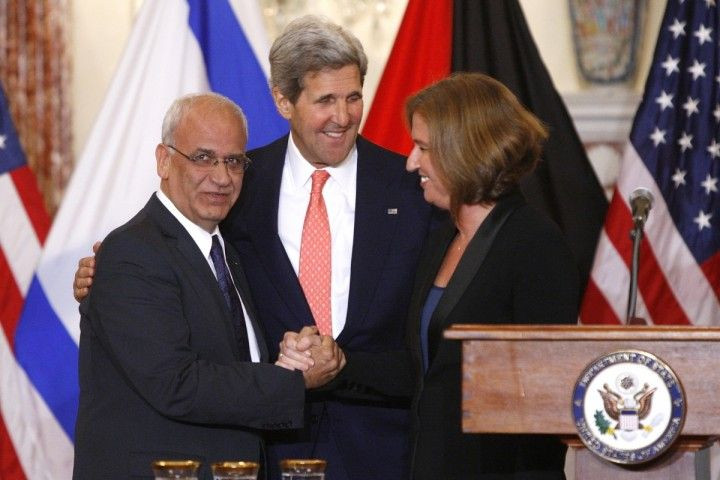Who Won The Gaza Conflict? Cairo Peace Talks Will Determine If Israel, Hamas Got What They Wanted

As a new round of peace talks between Israel and the Palestinian leadership begins in Cairo, both sides are assessing the damage, as well as the gains, from the monthlong war in Gaza. In traditional warfare, the state that experiences the greatest damage, whether to infrastructure or the number of people killed, is considered the loser. But the ongoing Gaza conflict, with hostilities currently suspended by a cease-fire, is not a traditional one, so declaring a victor could be nearly impossible, analysts say.
Both sides, Hamas and Israel, went into the war with specific objectives and goals, but it is too soon to tell what either side achieved. Some analysts said depending on the developments in Cairo, both parties could come out having achieved some, if not all, of their goals.
“There is a formula that will allow everyone to claim a victory,” said Khaled Elgindy, a senior scholar at the Brookings Institution, adding there could be an arrangement made during the Egypt-brokered talks that would give the Palestinian Authority, currently in control of the West Bank, governing power in Gaza with Hamas' consent. “Israel needs Palestinian unity and is calling for it. This solution was always the way out of the Gaza conundrum.” Hamas, the radical Muslim group in power in Gaza, formally rejects the existence of Israel, unlike the Palestinian government in the West Bank.
But there are other important goals Hamas and Israel laid out during the conflict. Some of them, if agreed on in the peace negotiations, could take months or even years to implement.
During the conflict, Hamas wanted to put enough pressure on Israel by launching rockets to end the Israeli blockade, and Israel wanted to destroy enough of what they call Hamas’ “terror tunnels” to thwart future threats from the Islamic group.
But Elliot Abrams, a senior research fellow at the Council on Foreign Relations and former Reagan and Bush administration official, said “it is too early to tell” whether those goals will be met. The Israeli Defense Force has claimed it has destroyed dozens of Hamas tunnels, predominantly in the northern part of the Gaza Strip. And Hamas still has rockets and is functioning in Gaza. In both cases, it will take time to determine if Israel has destroyed enough of Hamas’ infrastructure to deter attacks from the Strip and for Hamas to know if it has gained enough political leverage from its rocket launching to end the Israeli blockade.
One political faction included in the negotiations that could gain from the conflict -- even though it was not directly involved -- is the Palestinian Authority, which is in control of the West Bank.
Abrams said even if Hamas negotiates an easing of the Israeli blockade, the Palestinian Authority would most likely take the credit and organize the passageways into the Strip, possibly allowing for greater support among Gazans.
Palestinians living in Gaza City, trapped in the Strip during Israeli bombardments, said during the conflict in many ways, Hamas rockets, though not comparable to Israel’s weaponry, were the only things keeping them from being completely wiped out. Following the beginning of a cease-fire last week, Hamas held a rally in Gaza City and thousands of people showed up to support the group.
Others, though, said they are conflicted. They said they support the group because it is defending the Strip but don’t agree with its political ideology.
Despite some dissent among Palestinians living in Gaza, Abrams said, they have “no other option.” “A defeat of Hamas would be restoration of the Palestinian Authority in Gaza,” Abrams said. “But there is no way the PA, or Fatah, would defeat Hamas in the polls.”
On the Israeli side, Prime Minister Benjamin Netanyahu saw support for Israel fall abroad, but domestically Operation Protective Edge, the name given to the Gaza offensive, is popular.
A poll released by the Guardian Tuesday indicated a majority of British voters believe Israel acted in a disproportionate manner in the recent conflict. The poll found 52 percent of voters said Israel acted disproportionately when it responded to the firing of Hamas rockets, versus 19 percent who said Israel had acted proportionately.
But according to a poll conducted by the Israel Democracy Institute and Tel Aviv University, less than 4 percent of Israeli Jews say Israel used excessive firepower in Gaza.
On the ground, many Gazans are worried about a more basic problem than political victory. After weeks of daily airstrikes and shelling, many are returning to damaged or destroyed homes to sift through the rubble for their possessions. Others are still mourning the loss of more than 1900 people who were killed during the conflict.
Palestinians in Gaza are now wondering whether it was all worth it.
“They are thinking, 'Yes, we have lost a lot, but that is why we cannot go back because then it would have been all for nothing,'” Elgindy said. “There’s no other way than to keep fighting.”
© Copyright IBTimes 2024. All rights reserved.




















